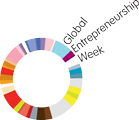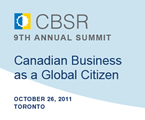Media Gallery - News
Occupied with ethics
With a worldwide protest focused on corporate greed, a conference that brings together business and community groups to discuss social responsibility couldn’t come at a better time

Eli Fathi, chair of the Corporate and Community Social Responsibility Conference, says Occupy protests show why bridges must be built between corporations and communities.
Photograph by: Chris Mikula, The Ottawa Citizen
OTTAWA — As the global Occupy movement continues to rail against the actions of big corporations, many Canadians are quietly sending an equally strong message to all businesses: ethics matter, and social responsibility is influencing key decisions such as where to work, where to invest and which products to buy.
A six-part public opinion survey, conducted from October 2010 to October 2011, revealed a substantive share of Canadians are thinking about social responsibility in various aspects of their lives. Many say they are willing to spend a little more, or earn a little less, to interact with what they deem to be “ethical” companies.
According to researcher David Coletto, chief executive of Ottawa-based Abacus Data, comments expressed about the Occupy Wall Street protests demonstrate that people are frustrated.
“They see that corporations aren’t necessarily being as socially responsible as they should be,” says Coletto. “Canadians are thinking about it. People are talking about it.”
The survey findings promise to be a hot topic at the fourth annual Corporate and Community Social Responsibility Conference, taking place Tuesday at Algonquin College.
The conference is organized by Eli Fathi, a major figure in Ottawa’s technology sector, as a place where businesses and community groups can discuss social, economic and environmental sustainability. About 1,000 attendees are expected.
“We’re giving a forum to people to speak and learn from other organizations across Canada and share best practices in these areas,” says Fathi. “We give equal weight to the corporate and the community.”
This year’s conference couldn’t have been better timed, given the momentum of the Occupy protest that began Sept. 17 in New York City’s financial district and has spread to many other cities, including Ottawa. Its participants are mainly protesting social and economic inequality and corporate greed, corruption and influence over government.
Fathi says he’s “not surprised at all” by their sentiments.
“Clearly, this is one of the things I’ve been promoting: if we don’t help the people who need help, we will end up with people barricading themselves and so on,” he says.
Fathi makes clear that he doesn’t espouse the movement, but he doesn’t entirely reject it. “There are different aspirations and requests, and some of them are valid.”
The protests, he adds, underscore the importance of building bridges between community and corporations.
“We need to make sure both sides are singing to the same tune,” he says. “We need understanding. We need to determine what supports are required. We have to help those who cannot help themselves.
“And we can do this, one person, one small cause at a time.”
Coletto calls the timing fortuitous.
“(The protests) are a manifestation of what happens when corporations and community groups don’t work together,” he says. “The conference is all about fixing that and increasing dialogue.”
The movement may have originated in the U.S. — though spurred by a campaign of the Canadian activist group Adbusters — but the wave of discontent, says Coletto, is universal.
“It has spread around the world because there’s a feeling that governments aren’t looking out for the average citizen.”
Mario Pilozzi, former CEO of Wal-Mart Canada, and MP Justin Trudeau are among speakers at this year’s conference, where the theme is the concept of “Shared Value,” conceived by Harvard Business School professor Michael Porter.
“If you are a coffee producer in Guatemala, and you have the coffee beans, and I am the company that buys the coffee beans from you, fair trade is one step. If I just buy from you, and give you money, that’s one aspect,” Fathi explains.
“But shared value means that not only am I buying from you at fair value, but I also teach you how to improve your crop; how to go to the next level, increase the value chain.
“The notion is that I teach you to become better, and in the process, your goodness is my goodness, because now you produce better quality beans and that’s why it’s called ‘shared value’ — we both benefit from it.”
Philanthropy, he says, is not enough. Canadians want to see real community involvement.
“Creating shared value by working together and not just taking a portion of the profit, but aligning the role of the social enterprise, the customer, the producer, with the role of the big company makes it more attractive and more productive and efficient.”
Fathi, 60, is co-founder of Chide.it, a software company that specializes in programs for online surveys and for collecting and reviewing online submissions. He founded Telexis, which became March Networks, and he has served on boards for the Ottawa Centre for Regional Innovation, Ottawa Chamber of Commerce and the Canadian Advanced Technology Association. He was recently elected to the board of the Community Foundation of Ottawa.
In 2004, he received the Order of Ottawa for his work in economic development, as well as OCRI’s Civic Entrepreneur of the Year award.
Since 2008, Fathi has organized and co-chaired the yearly Corporate and Community Social Responsibility Conference at Algonquin College. For this year’s event, Fathi and Coletto, a Chide.it customer, discussed surveying how Canadians feel about social responsibility and the role it plays in their lives.
Coletto, 29, who holds a PhD in political science, founded Abacus Data in July 2010. The firm specializes in public affairs, building online community panels and research into the millennial (18 to 30) demographic bracket. Abacus proudly notes that it was one of the polling companies to come closest in forecasting results of the Ontario election.
Coletto offered to conduct the survey for the conference at no charge. Abacus collected data online, taking representative samples of about 1,000 people, he says.
“It’s online, so we can’t really calculate a margin of error, but because it’s not random, what we try to do is mimic a random sample, so we make sure we have the proper distributions of age, gender, education level, region and language, and it’s proved to be quite accurate in terms of prediction political behaviour and political attitudes.”
Among the findings:
• 19 per cent of Canadians say they would be willing to spend more than 10 per cent more on a product or service if it was produced by an ethical company.
• More than half of Canadians consider themselves to be ethical consumers.
• Many Canadians say they consider the impact their investments have on their community and the environment, and about one in 10 have changed their portfolios to remove investments they consider socially irresponsible.
• 23 per cent say they would take at least a five-per-cent pay cut to work for a socially responsible company.
“If you think of social responsibility, it’s intimately tied to a corporation’s reputation,” says Coletto. “Look at BP and what happened there — its reputation probably took a hit and it would probably be more difficult to recruit people to come work for BP in the aftermath of that environmental disaster in the gulf.“People want to work for good companies, whether it’s good reputation in terms of the products they sell, or a good reputation in the work they do in the community; people want to be associated with good things.”
One part of the survey specifically addressed the Occupy movement.
“Half of Canadians said that most large corporations are unethical,” Coletto reports. “This suggests to me that corporate Canada as a whole has to think about what they’re going to be doing, and how do you dampen the concerns that people have while at the same time, keeping to the goal that you have, which is obviously to be profitable and make money?
“My message to corporations is: you’ve got to find a way to solve the problem.”
Learn more about the Corporate and Community Social Responsibility Conference at www.ccsrconference.com.





















